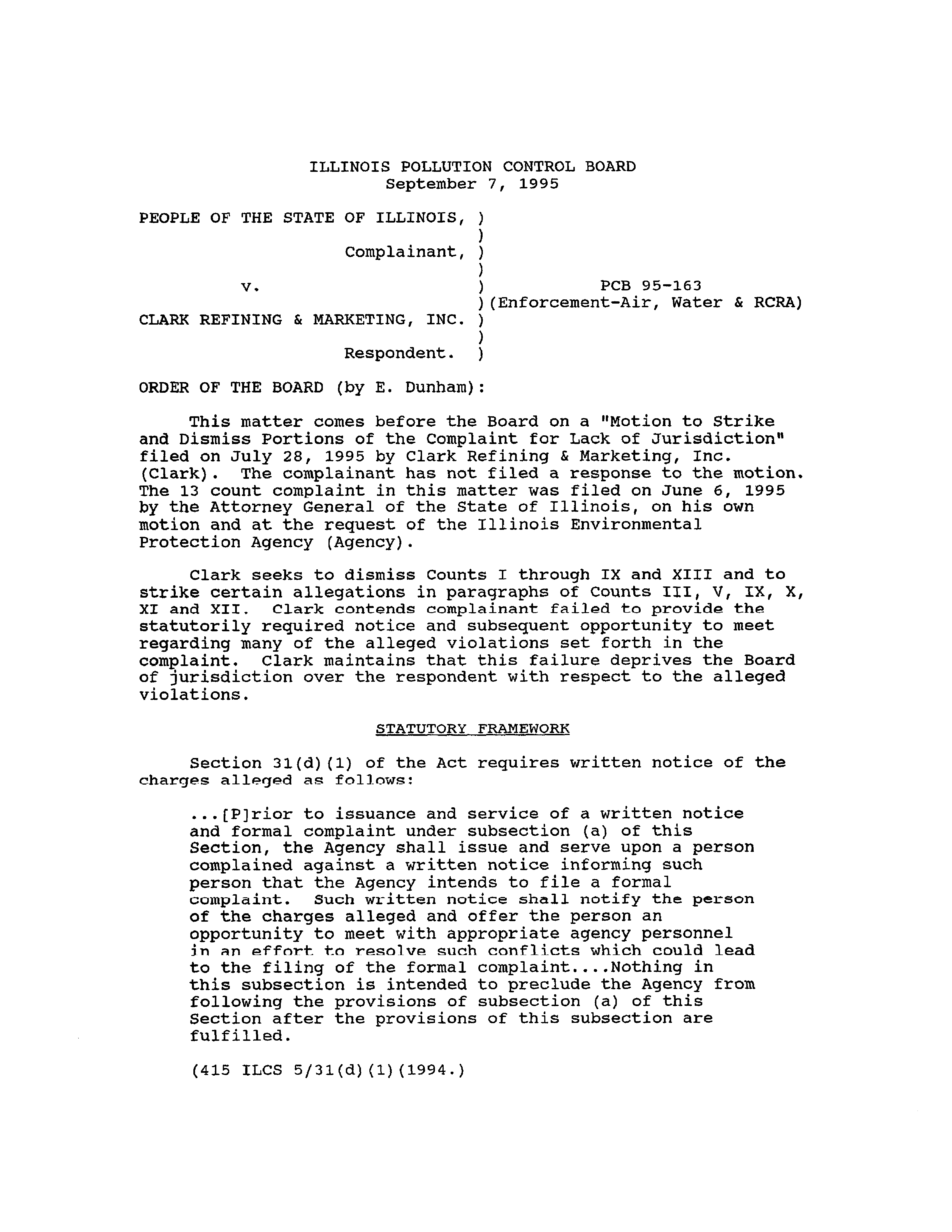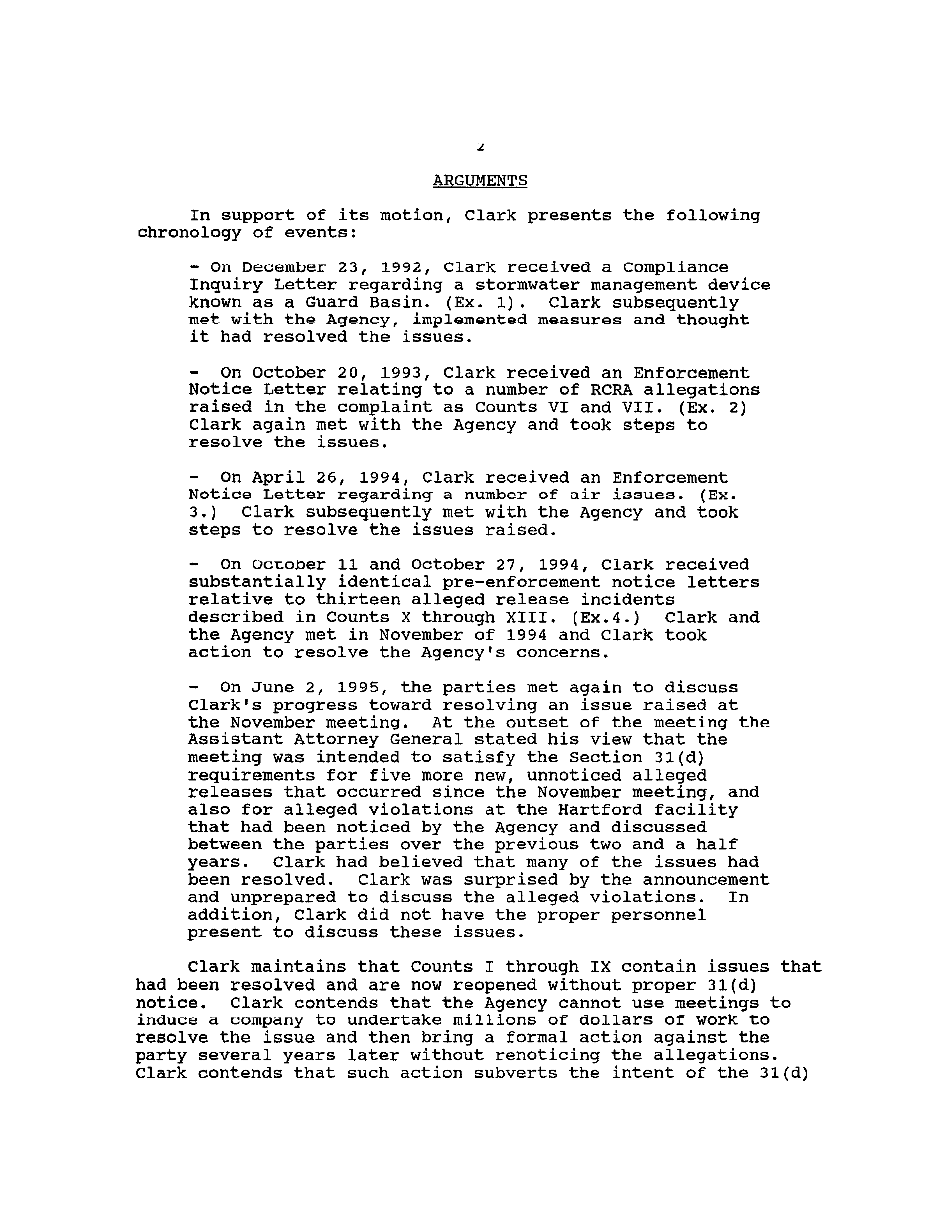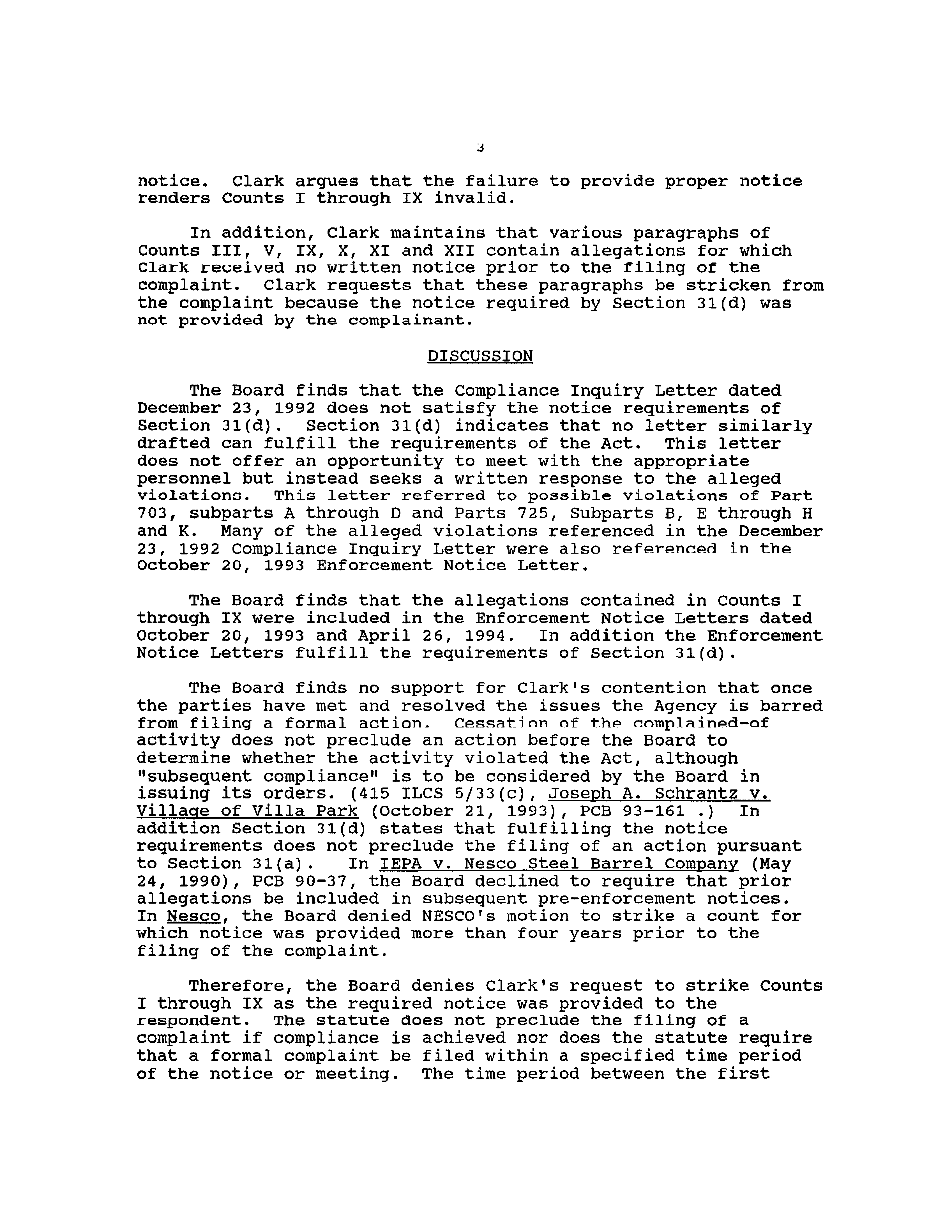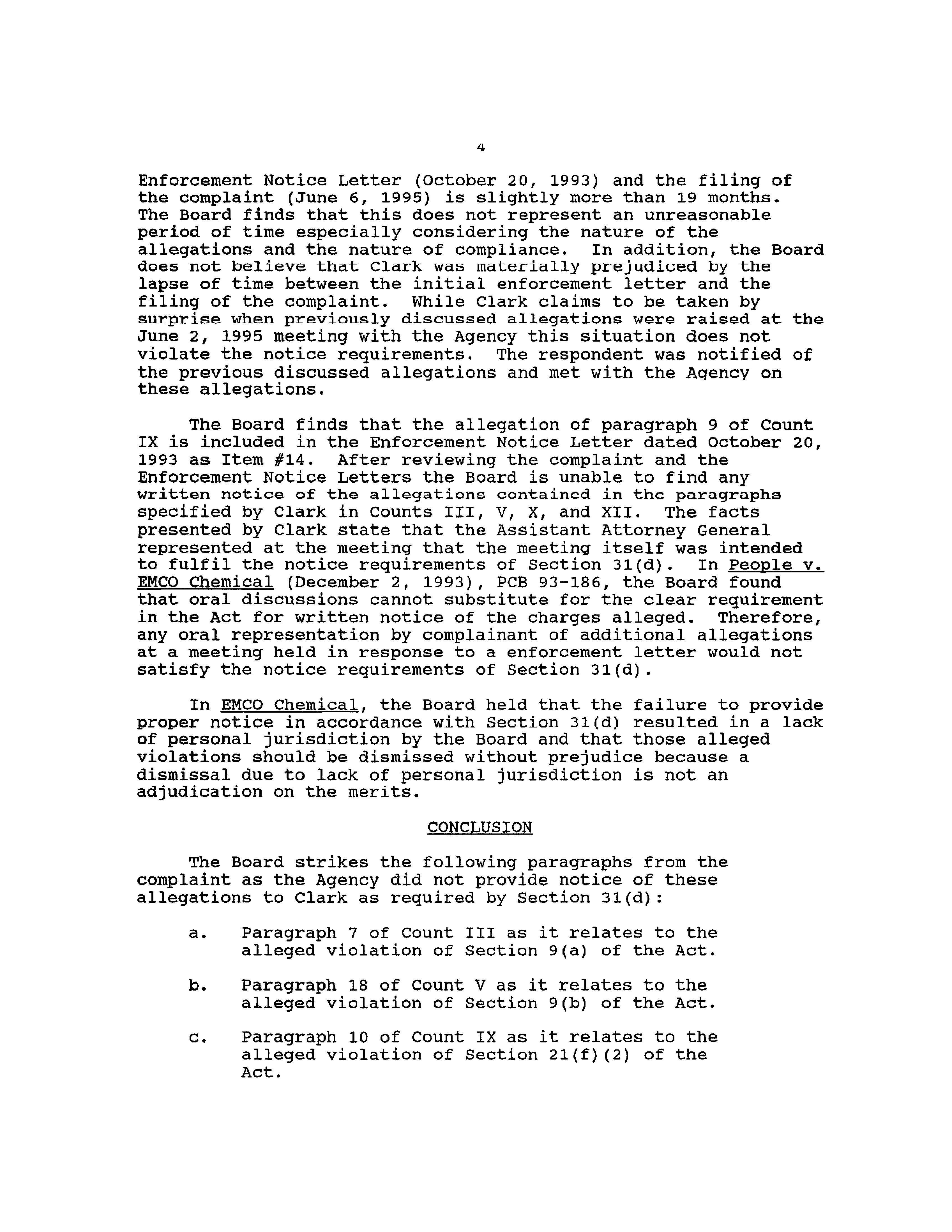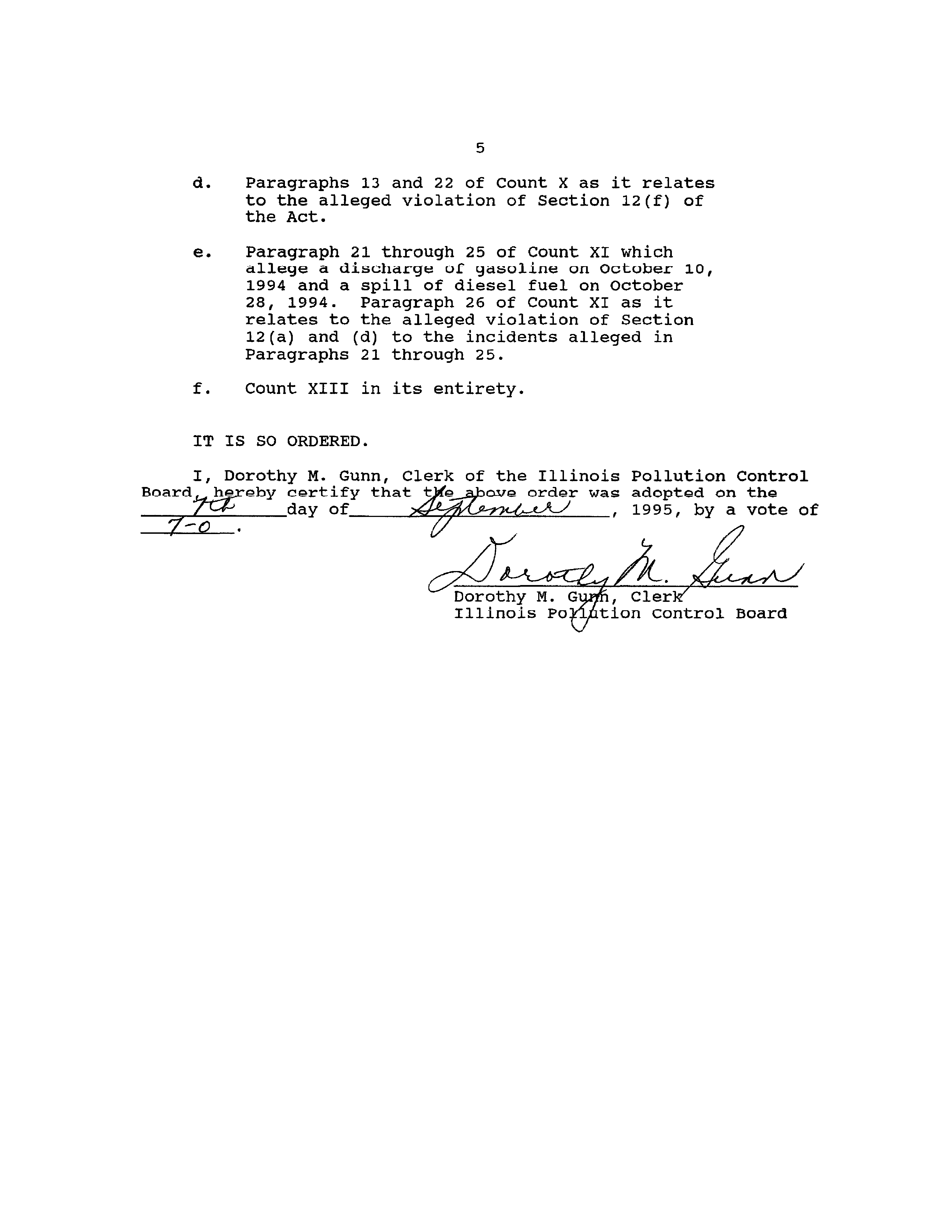ILLINOIS POLLUTION CONTROL BOARD
September
7,
1995
PEOPLE OF THE STATE OF ILLINOIS,
)
Complainant,
V.
)
PCB 95—163
)
(Enforcement-Air, Water
& RCRA)
CLARK
REFINING & MARKETING,
INC.
)
Respondent.
ORDER OF THE BOARD
(by E.
Dunham):
This matter comes before the Board on a “Motion to Strike
and Dismiss Portions of the Complaint for Lack of Jurisdiction”
filed on July 28,
1995 by Clark Refining
& Marketing,
Inc.
(Clark).
The complainant has not filed a response to the notion.
The 13 count complaint in this matter was filed on June
6,
1995
by the Attorney General of the State of Illinois,
on his own
motion and at the request of the Illinois Environmental
Protection Agency
(Agency)
Clark seeks to dismiss Counts I through IX and XIII and to
strike certain allegations in paragraphs of Counts III,
V, IX,
X,
XI and XII.
Clark contends
complainant failed to provide the
statutorily required notice and subsequent opportunity to meet
regarding many of the alleged violations set forth in the
complaint.
Clark maintains that this failure deprives the Board
of jurisdiction over the respondent with respect to the alleged
violations.
STATUTORY
FRANEWORE
Section 31(d) (1)
of the Act requires written notice of the
charges alleged
as follows:
Prior
to issuance and service of a written notice
and formal complaint under subsection
(a)
of this
Section, the Agency shall issue and serve upon a person
complained against a written notice informing such
person that the Agency intends to file a formal
complaint.
Such written notice shall notify the person
of the charges alleged and offer the person an
opportunity to meet with appropriate agency personnel
in an
effort
to resolve such conflicts which could lead
to the filing of the formal complaint.
.
.
.Nothing in
this subsection is intended to preclude the Agency from
following the provisions of subsection
(a)
of this
Section after the provisions of this subsection are
fulfilled.
(415 ILCS 5/31(d) (1) (1994.)
4
ARGUMENTS
In support of its motion, Clark presents the following
chronology of events:
—
On
December 23,
1992,
Clark received a Compliance
Inquiry Letter regarding a stormwater management device
known as
a Guard Basin.
(Ex.
1).
Clark subsequently
met with the Agency,
implemented measures and thought
it had resolved the issues.
-
On October 20,
1993,
Clark received an Enforcement
Notice Letter relating to
a number of RCRA allegations
raised in the complaint as Counts VI and VII.
(Ex.
2)
Clark again met with the Agency and took steps to
resolve the issues.
-
On April 26,
1994,
Clark received an Enforcement
Notice Letter regarding a number of air i~ue~.(Ex.
3.)
Clark subsequently met with the Agency and took
steps to resolve the issues raised.
-
On OccoiDer 11 and October
27,
1994,
Clark received
substantially identical pre—enforcement notice letters
relative to thirteen alleged release incidents
described in Counts
X through XIII.
(Ex.4.)
Clark and
the Agency met in November of 1994 and Clark took
action to resolve the Agency’s concerns.
-
On June 2,
1995, the parties met again to discuss
Clark’s progress toward resolving an issue raised at
the November meeting.
At
the outset of the meeting the
Assistant Attorney General stated his view that the
meeting was intended to satisfy the Section 31(d)
requirements for five more new,
unnoticed alleged
releases that occurred since the November meeting, and
also for alleged violations at the Hartford facility
that had been noticed by the Agency and discussed
between the parties over the previous two and a half
years.
Clark had believed that many of the issues had
been resolved.
Clark was surprised by the announcement
and unprepared to discuss the alleged violations.
In
addition, Clark did not have the proper personnel
present to discuss these issues.
Clark maintains that Counts
I through IX contain issues that
had been resolved and are now reopened without proper 31(d)
notice.
Clark contends that the Agency cannot use meetings to
induce a company to undertake millions or dollars or work to
resolve the issue and then bring a formal action against the
party several years later without renoticing the allegations.
Clark contends that such action subverts the intent of the 31(d)
notice.
Clark argues that the failure to provide proper notice
renders Counts I through IX invalid.
In addition, Clark maintains that various paragraphs of
Counts III,
V,
IX,
X, XI and XII contain allegations for which
Clark received no written notice prior to the riling or the
complaint.
Clark requests that these paragraphs be stricken from
the complaint because the notice required by Section 31(d) was
not provided by the complainant.
DISCUSSION
The Board finds that the Compliance Inquiry Letter dated
December 23, 1992 does not satisfy the notice requirements of
Section 31(d).
Section 31(d)
indicates that no letter similarly
drafted can fulfill the requirements of the Act.
This letter
does not offer an opportunity to meet with the appropriate
personnel but instead seeks a written response to the alleged
violations.
This letter referred to possible violations
of
Part
703, subparts A through D and Parts 725, Subparts B, E through H
and K.
Many of the alleged violations referenced in the December
23, 1992 Compliance Inquiry Letter were also referenced
in the
October 20,
1993 Enforcement Notice Letter.
The Board finds that the allegations contained in Counts
I
through IX were included in the Enforcement Notice Letters dated
October 20,
1993 and April 26,
1994.
In addition the Enforcement
Notice Letters fulfill the requirements of Section 31(d).
The Board finds no support for Clark’s contention that once
the parties have met and resolved the issues the Agency is barred
from filing a formal action.
Cessatirni
of
the complained—of
activity does not preclude an action before the Board to
determine whether the activity violated the Act, although
“subsequent compliance”
is to be considered by the Board in
issuing its orders.
(415
ILCS 5/33(c), Joseph A.
Schrantz
V.
Village of Villa Park (October 21,
1993), PCB 93—161
.)
In
addition Section
31(d)
states that fulfilling the notice
requirements does not preclude the filing of an action pursuant
to Section 31(a).
In IEPA v. Nesco Steel Barrel Company (May
24,
1990), PCB 90-37, the Board declined to require that prior
allegations be included in subsequent pre-enforceiaent notices.
In Nesco, the Board denied NESCO’s motion to strike
a count for
which notice was provided more than four years prior to the
filing of the complaint.
Therefore, the Board denies Clark’s request to strike Counts
I through IX as the required notice was provided to the
respondent.
The statute does not preclude the riling or a
complaint if compliance is achieved nor does the statute require
that a formal complaint be filed within a specified time period
of the notice or meeting.
The time period between the first
4
Enforcement Notice Letter (October 20,
1993)
and the filing of
the complaint (June
6,
1995)
is slightly more than 19 months.
The Board finds that this does not represent an unreasonable
period of time especially considering the nature of the
allegations and the nature of compliance.
In addition, the Board
does not believe that Clark was materially prejudiced by the
lapse of time between the initial enforcement letter and the
filing of the complaint.
While Clark claims to be taken by
surprise when previously discussed allegations were raised at the
June 2,
1995 meeting with the Agency this situation does not
violate the notice requirements.
The respondent was notified of
the previous discussed allegations and met with the Agency on
these allegations.
The Board finds that the allegation of paragraph 9 of Count
IX is included in the Enforcement Notice Letter dated October 20,
1993 as Item #14.
After reviewing the complaint and the
Enforcement Notice Letters the Board is unable to find any
written notice
of
the allegations contained in the paragraphs
specified by Clark in Counts III,
V,
X, and XII.
The facts
presented by Clark state that the Assistant Attorney General
represented at the meeting that the meeting itself was intended
to fulfil the notice requirements of Section 31(d).
In People v.
ENCO Chemical (December
2,
1993), PCB 93-186, the Board found
that oral discussions cannot substitute for the clear requirement
in the Act for written notice of the charges alleged.
Therefore,
any oral representation by complainant of additional allegations
at a meeting held in response to a enforcement letter would not
satisfy the notice requirements of Section 31(d).
In ENCO Chemical, the Board held that the failure to provide
proper notice in accordance with Section 31(d)
resulted in a lack
of personal jurisdiction by the Board and that those alleged
violations should be dismissed without prejudice because
a
dismissal due to lack of personal jurisdiction is not an
adjudication on the merits.
CONCLUSION
The Board strikes the following paragraphs from the
complaint as the Agency did not provide notice of these
allegations to Clark as required by Section 31(d):
a.
Paragraph
7 of Count III as it relates to the
alleged violation of Section 9(a)
of the Act.
b.
Paragraph 18 of Count V as it relates to the
alleged violation of Section 9(b)
of the Act.
c.
Paragraph 10 of Count IX as it relates to the
alleged violation of Section 21(f) (2)
of the
Act.
5
d.
Paragraphs
13 and 22 of Count X as it relates
to the alleged violation of Section 12(1)
of
the Act.
e.
Paragraph 21 through 25 of Count XI which
alleye
a discharge of yasoline on
October 10,
1994 and a spill of diesel fuel on October
28,
1994.
Paragraph 26 of Count XI as
it
relates to the alleged violation of Section
12(a)
and
(d)
to the incidents alleged in
Paragraphs 21 through 25.
f.
Count XIII in its entirety.
IT IS SO ORDERED.
I, Dorothy N.
Gunn,
Clerk of the Illinois Pollution Control
Board
he ehy certify that
t
e
eve order
was adopted on the
day of
,
1995,
by a vote of
Dorothy N.
G1pØI,
Clerk”
-
Illinois Po~/itionControl Board
7-p
